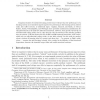Free Online Productivity Tools
i2Speak
i2Symbol
i2OCR
iTex2Img
iWeb2Print
iWeb2Shot
i2Type
iPdf2Split
iPdf2Merge
i2Bopomofo
i2Arabic
i2Style
i2Image
i2PDF
iLatex2Rtf
Sci2ools
102
click to vote
COLT
1998
Springer
1998
Springer
Robust Learning Aided by Context
Empirical studies of multitask learning provide some evidence that the performance of a learning system on its intended targets improves by presenting to the learning system related tasks, also called contexts, as additional input. Angluin, Gasarch, and Smith, as well as Kinber, Smith, Velauthapillai, and Wiehagen have provided mathematical justification for this phenomenon in the inductive inference framework. However, their proofs rely heavily on self-referential coding tricks, that is, they directly code the solution of the learning problem into the context. Fulk has shown that for the Ex- and Bc-anomaly hierarchies, such results, which rely on self-referential coding tricks, do not hold robustly. In this work we analyze robust versions of learning aided by context and show that -- in contrast to Fulk's result above -- context also aids learning robustly. Also, studied is the difficulty of the functional dependence between the intended target tasks and useful associated contex...
COLT 1998 | Intended Target | Machine Learning | Multitask Learning | Self-referential Coding Tricks |
Related Content
| Added | 05 Aug 2010 |
| Updated | 05 Aug 2010 |
| Type | Conference |
| Year | 1998 |
| Where | COLT |
| Authors | John Case, Sanjay Jain, Matthias Ott, Arun Sharma, Frank Stephan |
Comments (0)

